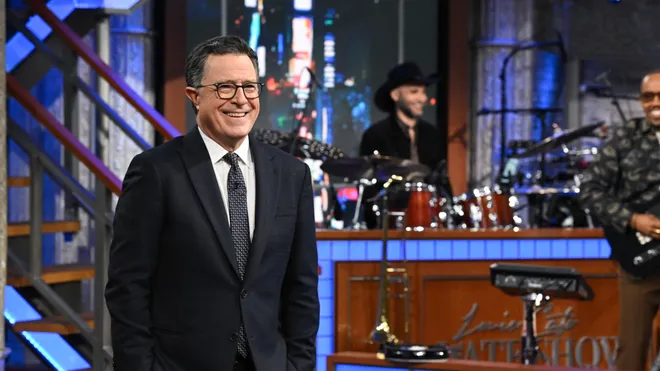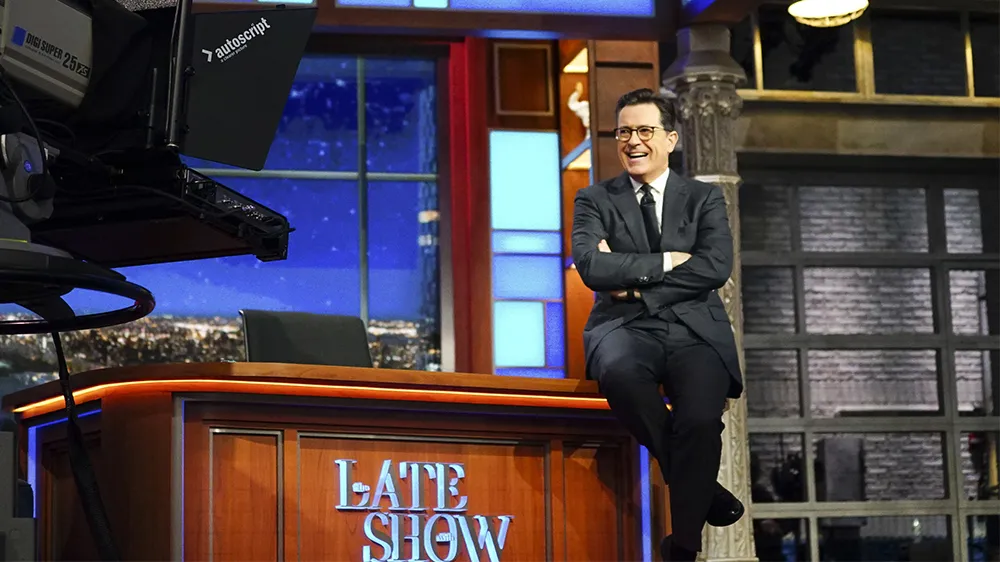A Shocking Announcement That Signals the End of an Era
When Stephen Colbert announced on July 17 that “The Late Show” would come to an end in May 2026, it didn’t just rattle his studio audience—it shook the foundation of late-night television.
After more than a decade of sharp political satire, viral interviews, and nightly monologues that became cultural touchpoints, Colbert revealed that CBS won’t be replacing him. The show isn’t just losing its host. It’s going off the air entirely.
That’s right—“The Late Show” will disappear altogether.
And this isn’t just about one host or one network. It’s about the possible collapse of an entire genre that once ruled late-night screens.

Why Is CBS Cancelling ‘The Late Show’?
The official word from CBS and its parent company Paramount? It’s about money.
Late-night TV is becoming more expensive to produce and less profitable to maintain.
In a statement, CBS said, “This is purely a financial decision against a challenging backdrop in late night. It is not related in any way to the show’s performance.”
But let’s not ignore the bigger picture here. Colbert’s show was still leading in ratings, regularly topping Fallon and Kimmel in the coveted 11:35 p.m. slot.
So what’s really going on?
The timing coincides with Paramount’s push to complete an $8.4 billion merger with Skydance Media. And Colbert? Well, he hasn’t exactly kept his opinions quiet—especially when it comes to politics and even his own corporate bosses.
Just days before announcing the cancellation, Colbert blasted CBS for settling a lawsuit with Donald Trump for $16 million. He called it a “big fat bribe” and openly questioned his trust in the company.
In the high-stakes world of media mergers and political pressure, could Colbert’s candor have been too much?
Video : Stephen Colbert Announces The Cancellation Of “The Late Show”
Late-Night Television Is Cracking Under Pressure
The truth is, late-night TV hasn’t been healthy for years.
Viewership has steadily declined. Production costs continue to rise. And the audiences networks want—young, engaged, ready to buy—are watching YouTube, TikTok, or skipping TV entirely.
The format that once made stars of Johnny Carson, David Letterman, and Jay Leno now feels outdated.
Think about it:
The monologue-interview-music format hasn’t changed in decades.
Younger audiences don’t stay up late—they scroll.
The best jokes go viral the next morning, not during the broadcast.

Even successful hosts like Fallon and Kimmel are struggling to retain relevance. Kimmel openly jokes about retiring. Fallon’s YouTube views have dropped from millions to mere thousands. And Conan O’Brien has already made the jump to podcasting.
If Colbert—one of the sharpest, smartest, and most-watched hosts in the game—can’t survive in this environment, who can?
From Cultural Icon to Media Casualty: What Colbert’s Exit Means
Let’s rewind to when Colbert first took the “Late Show” reins in 2015.
He was stepping into the massive shoes of David Letterman, trading in his over-the-top conservative alter ego from “The Colbert Report” for his real self.
And he nailed it.
Colbert leaned into politics, especially during Trump’s presidency, offering a nightly dose of satire that millions came to rely on.
He wasn’t just making jokes—he was offering clarity, perspective, and a kind of sanity amid chaos.
So the news that he’s leaving isn’t just about the end of a TV show. It’s the loss of a voice that helped shape the way millions processed the world.
Video : CBS is ending ‘The Late Show with Stephen Colbert’, calling it ‘a financial decision’
The Business of Late Night Is Broken
Even before Colbert’s announcement, the warning signs were everywhere:
- NBC’s “Late Night with Seth Meyers” cut its band in 2024 to save money.
- CBS axed “After Midnight” after just one season.
- “The Tonight Show” with Fallon went from five nights to four.
- Samantha Bee’s show was canceled.
- Conan moved from late-night to long-form podcasting.
Networks aren’t just cutting shows—they’re cutting back expectations.
And it’s not just because of ad revenue or ratings. It’s about relevance.
Today’s younger audiences don’t wait for 11:35 p.m. to hear a celebrity talk about their new movie. They get it on Instagram, TikTok, or YouTube clips.
In an era where content is immediate and endless, traditional late-night feels like a relic of a slower, more centralized media world.

So… Is Late-Night TV Dead?
Honestly? Not dead—but it’s dying.
The format needs reinvention.
People still want satire. They still crave conversation. They still want to laugh at the day’s madness.
But they want it on-demand. Shorter. Smarter. More real.
Colbert’s exit isn’t the death of comedy. It’s just the end of one chapter.
And what comes next depends on who’s willing to think differently.
What’s Next for Stephen Colbert?
Colbert hasn’t said much about what comes after “The Late Show.”
But let’s be clear—he’s not going away.
This is a guy who built an entire world out of a fictional character on Comedy Central and turned it into a career most comedians would envy.
Podcasting? Streaming? A new kind of late-night for the digital age? All are possibilities.

He has the talent, the fanbase, and the cultural weight to do something entirely new—if he wants to.
And while he may be losing his nightly stage, his voice will still matter.
Conclusion: The End of Late Night, But Not the End of the Conversation
Stephen Colbert’s departure from CBS is more than the end of a show—it’s the symbolic end of an era.
The old model of late-night is cracking under the pressure of changing tech, shifting viewer habits, and corporate reshuffling.
But this isn’t just a goodbye. It’s an inflection point.
Yes, The Late Show is going away.
But comedy, insight, and cultural commentary aren’t disappearing.
They’re just looking for a new home.
And if we’ve learned anything from Colbert’s career, it’s this: don’t count him—or late-night’s potential—out just yet.